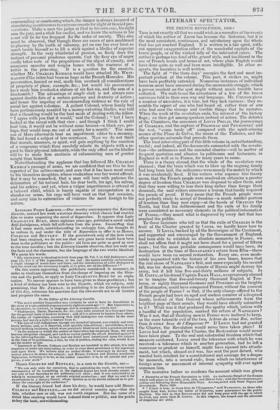LITERARY PETITE , 1IIACBI , 171:.-011r worthy contemporary the Literary. Gazette, noticed last
week a curious discovery which chance ht4d enabled . lint to make respecting the novel of Separation. It appears that Lady CHARLOTTE BURY, about eighteen years ago, published a novel called Self-Indulgence, which fell still-born from the press. Conceiving that it had some merit, notwithstanding its unhappy fate, she thought fit to redress it, and under the title of Separation to offer it to Messrs. COLBURN and BENTLEY. If the groundwork only of the first work 'had been retained, we do not see that any great harm Would have been done to the publishers or the public : old facts are quite as good as new -to the true novelist ; but the Literary Gazette observes, that not only are the facts and the characters, but the language of the two works identical. We quote his words. "The whole story is identical in both from page 68, Vol. I. in Self-Indulgence, and page 121, Vol. I. of The Separation, to the cad: the names carefully rechristened, u slight change of words here and there, and the introduction of a few dialogues to spin the work out the necessary length, as to price, are all the difference !" On this notice appearing, the publishers considered it necessary, in order to vindicate themselves from the charge of imposing on the libra- ries and the public, to apply to Lady CHARLOTTE BURY for an expla- 'nation. No answer appears to have been given to these gentlemen ; but a kind of defence has been sent to the Gazette which we subjoin only premising, that Mr. JERDAN, in publishing in the Literary- Gazelle of this day, reiterates his assertion that the two novels are to all intents and purposes the same.
To the Editor of the Literary Gazette.
"The novel entitled Separation may certainly be said to have its foundation in the story of a tale published anonymously eighteen years ago !! But Separation is, in characters, in conduct, in language, and in arrangement, wholly new. " Shakspeare, Dante, Boccacio, Ste. &c., have been resorted to a thousand times for the ground-work of modern fictions ; and, if it is allowed to borrow from others, the author of Separation assuming that Self-Indulgence was written by the same person, had surely a right borrow from it. "The tale of Self-Indulgence, though not devoid of interest, was crudely and care- lessly written, and, as it deserved, sank speedily into oblivion ; nevertheless, it con- tained striking incidents, which were peculiarly fitted to set forth a great moral end. . " in the manner in which the author of Separation has employed these, the work became altogether changed, and such as cannot justify the attack directed against it in the Literary Gazette. In fact, bad any doubt been entertained upon the subject
at the time of its publication, a line, by way of preface, stating the case, would have zet the matter at rest.
." Inasmuch as Messrs. Colburn and Bentley are involved in this attack, it is only requisite to make one observation, in order to clear these gentlemen of the aspersion cast upon them. We believe that no author thinks it necessary to declare the source whence he draws his subject; and Messrs. Colburn and Bentley purchased Separation, believing it to be, as the author considers it is, to all intents and pur- poses, a new work."
Messrs. COLBURN and BENTLEY, in a note to the Gazette, say- " We can only state for ourselves, that in publishing the work, we were totally 1111CODSCiOGS of its resembling in the slightest degree any honk already extant, as vur note of last Saturday to the authoress will show; that it was submitted to us - .wholly in manuscript, as an entirely original production; and that we sent it for examination to a literary friend, whose opinion as to its merits induced us to pur- chase the copyright of the authoress."
If the literary friend had done his duty, be would have told Messrs.
• CoLnuniv and BENTLEY,—aS we did several months ago,—that the tale,' whether new or old, was not worth sixpence. But the name of a titled blue stocking would have induced them to publish, and the public lobuy the book, notwithstanding.


























 Previous page
Previous page